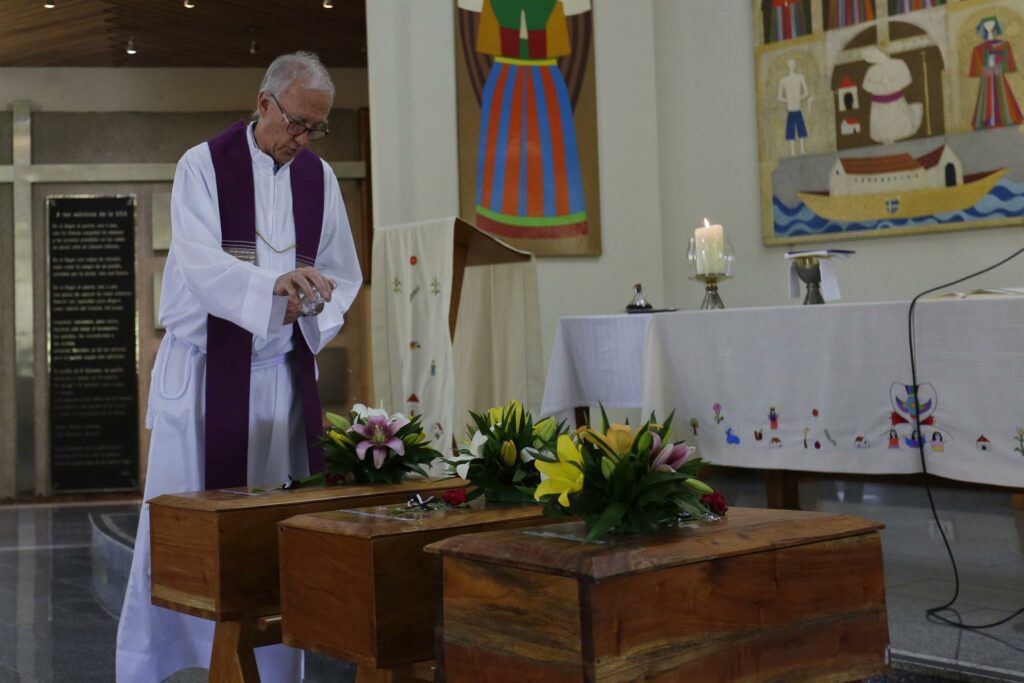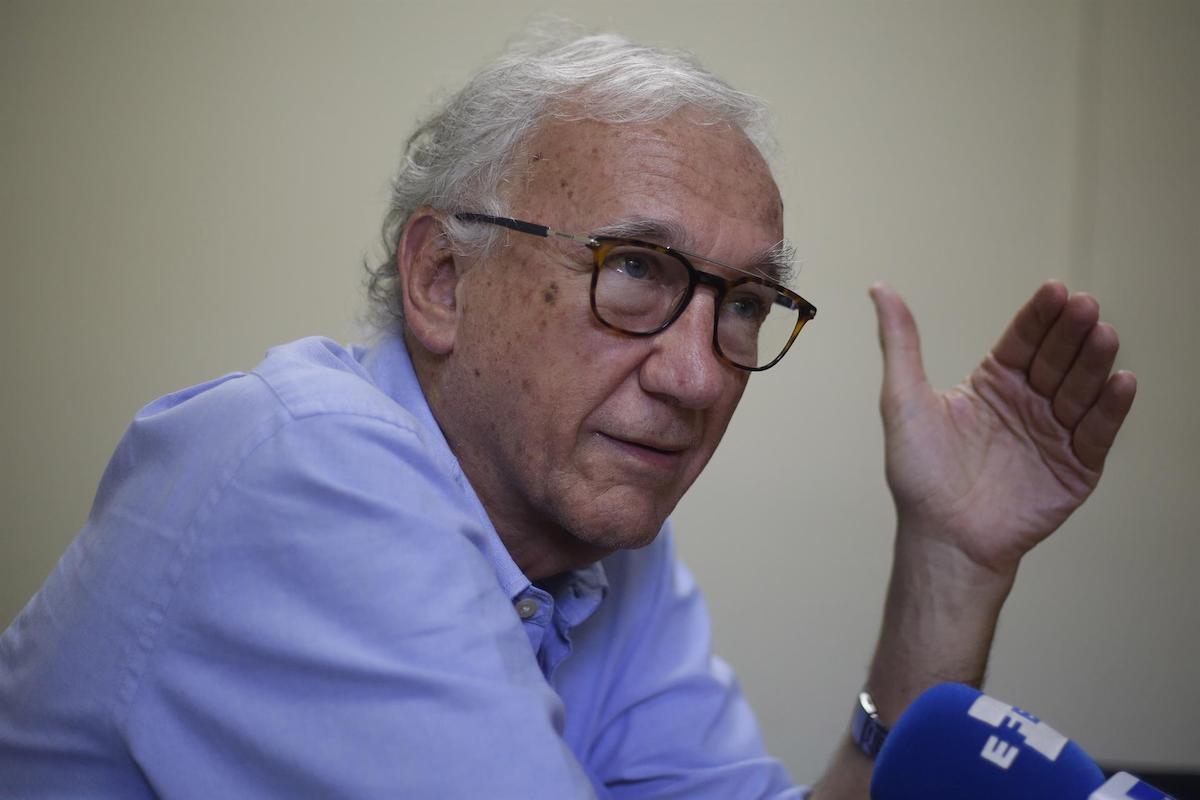Father José María Tojeira was just a few meters away from the murders of eight people, among them six Jesuit priests, at Universidad Centroamericana José Simeón Cañas (UCA) in El Salvador. It happened in 1989 while the small Central American country was in the midst of a civil war. The priests promoted a peaceful solution for conflict resolution between the government and the leftist guerrilla movement, Farabundo Martí para la Liberación Nacional (FMLN). And this angered the political and military powers of the time, who took vengeance.
It was a massacre that marked the university forever. Since then, Tojeira has led the search for justice that resulted in a historic sentence in 2020: magistrates concluded that the eight murders were “plotted, planned, agreed and ordered by members of the high command of the Armed Forces.” Former Colonel Inocente Orlando Montano was sentenced to 133 years and three months in prison. Since then, at least 13 people, among them ten former military commanders, have been indicted for the UCA massacre.
Tojeira, born in Spain in 1947, arrived in El Salvador in 1985 after living in Honduras for 16 years. Between 1988 and 1995, he was provincial (superior) of the Jesuits in Central America. He assumed the position of rector of UCA El Salvador in 1997 and left office in 2010. He is remembered as one of the rectors who maintained the social projection of the university.
One of his last jobs was as director of the UCA Human Rights Institute (Idhuca) between 2016 and 2020. At 76 years of age, he remains an observer of social reality in El Salvador and the Central American region. In this interview with DIVERGENTES he talks about the confiscation of UCA Nicaragua and the attack of the regime of Daniel Ortega and Rosario Murillo against the Jesuit Order.
Tojeira makes it clear that he is not speaking on behalf of the Jesuit Order, but as a Jesuit “concerned about the situation in Central America”.

How is the Jesuit Order taking the confiscation and seizure of its assets announced yesterday by UCA Nicaragua?
The Jesuit Order in Central America has already issued a statement condemning the incident and requesting that the measures be reversed and that the University be given freedom to work. There is indignation among Jesuits and solidarity with their Nicaraguan companions.
What is the message from the Jesuit Order to students and teachers who have lost their university today?
I understand that they are asked for endurance and hope, which are also attitudes of the Jesuits themselves.
What does it mean that this closure was made by a government (that of Daniel Ortega and Rosario Murillo) that claims to be leftist and with some ties to UCA since the 1980s?
What was once a democratic and leftist government is now an authoritarian dictatorship with a supposedly leftist populist language. Ties with UCA and with Jesuits who collaborated in the beginning with the Sandinistas, such as Fernando Cardenal, have long since been severed, precisely because of the authoritarian, corrupt and demagogic drift of the Ortega-Murillo regime.
UCA was one of the best universities in Nicaragua. With this closure, what do you think will be the impact on Nicaraguan society?
Dictatorships always hate critical, rational and humanist intelligence, whether it comes from Christian or secular thinking. The impact is undoubtedly of a strong deterioration and cultural impoverishment. The best historical archive of Nicaragua is in UCA. If the theft of UCA property were consummated, these government fools would enter the archive like tacuazín (possums) in a chicken coop.
Are there precedents like this with UCA campuses in El Salvador or Guatemala?
No expropriation or freezing of accounts. As you know, six Jesuits and two collaborators were killed at UCA in El Salvador.
We have information that there is also an attack against Jesuit schools (“Centroamérica” and “Loyola”), do you know anything about this, and about the Jesuits who fled in June and in the last few weeks due to this persecution?
I understand that for the moment only one Nicaraguan Jesuit was not allowed to return to Nicaragua and another, also a Nicaraguan, has left Nicaragua because of difficulties in his pastoral work. The rest remain in Nicaragua and have no intention of leaving nor does the Order want to remove them.
The Jesuit Order has been persecuted by some regimes. Do you think that with these measures it will disappear from Nicaragua?
It would not be the first time that we are expelled from a country. But in Latin America, governments that expel religious people end up being expelled from their posts and powers. And the religious come back.
How do you value the work of the Jesuit Order in Nicaragua?
I think it is a serious work from a religious and social point of view.
What do you think is the impact of the Jesuit Order in Central America?
We try to educate in critical conscience, in the evangelical ideals and simultaneously to accompany the poor and vulnerable majorities in solidarity with their problems. Whether we do it well or not, it is up to the people to say so.
Since the 2018 crisis in Nicaragua, UCA and its members have been harassed by the Ortega and Murillo regime, until the confiscation of the university took place. What measures will the Jesuit Order take to protect its members in this country?
Jesuits are protected by their honesty and service to the people. They are also defended by many people in solidarity at the international level. I don’t know what protection they may need other than our prayers.
Taking into account that Pope Francis comes from this order and has openly criticized the Ortega-Murillo family, even comparing them to the Hitler dictatorship, do you consider that this could be a revenge against the Jesuit Order?
I do not believe that this is the reason. The persecution against the Jesuits is due to their freedom and the support given to the life and rights of Nicaraguans.





